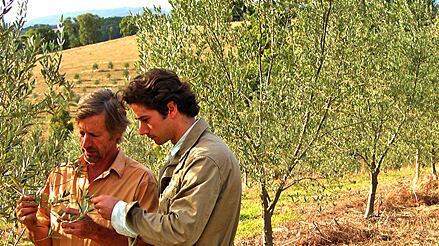In Australia, the production of olive oil is a relatively recent pastime turned profession by adventurous farmers and passionate families alike. As Australia lies in the opposite hemisphere to Europe, our harvest season occurs during April and May. As late autumn mornings promise cool clear skies, families, friends, and seasoned pickers are descending on olive groves around the country to harvest this season’s fruit.

In Yellingbo, our family olive grove lies among the rolling hills of the Yarra Valley, which is known mostly for its wine and dairy. For us, this journey began 12 years ago, when in one long weekend my father planted 3,000 olive trees. As olive trees require up to seven years to produce their first harvest, this allowed him ample time to reflect what would be done when his trees grew to bear fruit. Seven years later they did, and a brand was born and a small piece of family history was made.
Eschewing technology, we opt for hand-harvesting the olives. The chosen harvesters are gathered by bribing extended family and friends to indulge on lamb cooked over hot coals and copious amounts of our neighbor’s wine. When the harvest is done, one of the most important steps is pressing the olives as quickly as possible. Olives begin degrading as soon as they are plucked from their branches, and it is crucial that they must be quickly sent to the press. (It is interesting to note that grapes pressed for the production of wine can yield up to 80 percent grape juice, while olives offer at best 15 percent oil. This is often why premium oils can get expensive.)
After the olives are placed in the press, they are gently "malaxed" for up to three hours where they turn into a rich green paste. This is then pumped into a centrifuge, which uses the force of gravity to separate the oil from the remaining pulp. As the centrifuge spins, everyone watches. After several minutes, the season’s first oil begins to fall, and everyone breathes again.
The harvest continues for up to two weeks. Hand harvesters come and go. More lamb is seared over burning coals and the wine keeps flowing. When the last olives have yielded their golden oils, they are left to settle for two weeks in stainless-steel tanks. Then begins the process to create the master blend of oils from the different olive varietals grown, which is a very delicate process. Blending olive oil is similar to blending wine. It is important that a smooth and balanced experience on the pallet is created. When blended properly, olive oil is deliciously rich, fruity, creamy, nutty, and complex.
For many people olive oil is all about the fancy packaging, but there are really two key things to keep in mind when purchasing oil that you can store for awhile: you should look for a bottle that best keeps out both sunlight and oxygen. One day during our olive harvest, I filled an empty wine cask with a liter of olive oil, knowing it would be needed for everyone’s lunch. As I watched the oil being poured onto sandwiches and pastas, I suddenly realized the "cask" was protecting the oil from just those two things. Thus began a tradition of packaging the oil in casks instead of the glass bottles like you may find in your local grocery store. Storing your olive oil properly is essential to getting keep your product at its best and getting your money’s worth.
The olive season ends when the last olives are picked, but that does not mean the work is completely done. During the off season hours are spent pruning lower tree branches to protect the younger plants from disease, and from becoming food for the local kangaroos. But for now it is time to rest for a bit. No one ever said farming is easy. Perhaps though, like everything in life, anything worth doing is worth doing well. Hopefully, you can taste the difference.
Help support Women for Women International (WfWI) while treating Mom to a premium gourmet gift! From today until Friday (April 27- 29) only, Yellingbo Gold will donate 100 percent of profits from sales of their unique two-liter cask of Extra Virgin Olive Oil to WfWI. Go to: www.yellingbo.com and use checkout code: WFW100.
Plus: Check out Hungry Beast, for more news on the latest restaurants, hot chefs, and tasty recipes.
Jeremy Meltzer began producing Yellingbo Gold Extra Virgin Olive Oil in 2005 with his father on their family farm in Australia. He also works passionately as an ambassador for the White Ribbon Campaign, which uses men to raise awareness of violence against women and challenges the conditioning that allows this to continue. Apart from being sold online, Yellingbo Gold will also soon be available in William Sonoma.






